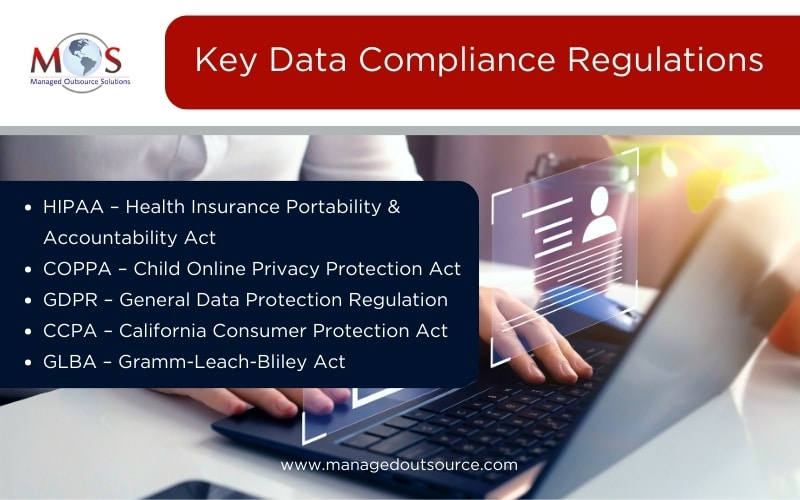Sensitive information is kept on paper in every business. But keeping these records in storage necessitates a lot of room in addition to several conveniences, like security and secure shredding procedures. The higher the level of security needed, the higher the costs to the business. A reputable document scanning company can significantly contribute to enhancing data security and compliance by seamlessly transitioning your physical documents into a secure digital format.
Scannable and digitalized documents provide an answer to these problems and are among the most important first steps in your business’s digital transformation. Organizations are turning to secure document scanning and data digitization as dependable methods to manage paper documentation efficiently and safely as the importance of data security and regulatory compliance grows.
How Document Scanning and Cloud Storage Can Make Compliance Easier
Secure Document Scanning
Scanning physical documents into digital formats is a secure document scanning process. By using this procedure, businesses can convert their paper documents into electronic versions that are simpler to handle, store, and access. But secure document scanning offers advantages that go beyond practicality. It is crucial for guaranteeing data security and adherence to different laws.
Lowering the risk involved with physical documents is one of the main benefits of secure document scanning. Paper documents are easily misplaced, destroyed, or pilfered. On the other hand, strong security measures such as audit trails, access controls, and encryption, safeguard digital copies. By doing this, the likelihood of illegal access or data breaches is reduced.
Enhancing Data Security
Data security is one of the most important issues for any company, especially in light of the recent increase in cyberattacks. A document scanning service is essential for improving data security in a number of ways.
- Encryption
To safeguard their contents, documents that are scanned and turned into digital files can be encrypted. This guarantees that even in the unlikely event that someone unapproved accesses the files, they will be unable to decrypt the data without the encryption key.
- Access Controls
Digital documents can be given access controls so that only individuals with the proper authorization can view, edit, or remove them. This aids in stopping illegal access and data leaks.
- Backup and Disaster Recovery
Regularly backing up scanned documents to cloud storage or secure servers can serve as a dependable disaster recovery solution. In the event of physical harm or data loss, companies are able to promptly retrieve their records.
Ensuring Regulatory Compliance
Businesses cannot compromise on adhering to various regulations and industry standards. Companies that violate compliance requirements risk significant fines, penalties, legal action, and frequently irreversible harm to their brand. Data digitization and secure document scanning assist organizations in adhering to the law by:
- Data Retention
Certain regulations require that data must be retained for certain lengths of time. By automating document disposal when needed, secure document scanning enables organizations to simply manage and comply with these retention requirements.
- Document Tracking
Document history and tracking are necessary for compliance. Due to their ease of access, viewing, tracking, and management, digital documents help ensure that organizations can produce the required documentation for audits or investigations.
- Data privacy
Secure document scanning makes sure that private client information is sufficiently safeguarded at a time when data privacy is crucial. This helps maintain compliance and foster customer trust.
Digital and Physical Security
One of the main concerns that compliance laws address is secure access. A fundamental component of any data and document compliance strategy is guaranteeing that access to PII (personally identifiable information), PHI (protected health information), and financial data is restricted to authorized personnel only. Since it’s not always feasible to completely do away with paper records, physical security is still a crucial component of compliance for many businesses. Some methods for safeguarding physical records include locked file cabinets, GPS-tracked cars, and key card-protected buildings. Digital security, on the other hand, provides extra advantages like high-level encryption, firewalls, password protection, role-based access, and audit trails that are normally not achievable with physical security. Transforming your hard copy documents into digital format enables a more adaptable and quick method of document security.
Maintaining a layered approach allows you to incorporate extra security measures within the cloud while still allowing for some physical security measures like key-card access.
Disaster Recovery & Data Backups
Within the cloud, you are protected from physical and digital security threats, so your data is never lost. All it takes is one unanticipated disaster to destroy all of your physical data storage. A data disaster can be fatal for many businesses, which is why redundant non-localized storage is essential. Digitizing documents can significantly reduce the risk of physical threats, such as fire or flood, to your valuable data. But digitization by itself isn’t a panacea. Paper documents can be digitized and kept on a local server, but you should always think about the potential consequences of not having additional, off-site backups of your content.
Digital content that is siloed can be just as vulnerable as physical documents, and it offers little benefit to your team in terms of safe data access and collaboration. In the short run, DIY digital or physical storage might seem less expensive, but it might not adhere to industry compliance standards. The best option for storing data is fully redundant, cloud-based storage that can also be customized and has extremely flexible security measures.
Information Requests & Retention Schedules
Certain compliance laws, like the California Consumer Protection Act (CCPA), mandate that you give the customer access to protected PHI/PII as soon as possible. Information requests are simple and safe when using digital documents. Consumers ought to be aware of the data you hold about them and how it is utilized. Data that has been stashed away and concealed in paper documents can be difficult to retrieve and communicate to your clients. Information requests can be completed almost effortlessly with the intelligent organization and search capabilities of digital documents. Digital documents have the added benefit of being easily searchable and capable of being routed through workflows that automate retention schedules.
Utilize form fields, keywords, or other identifiers to identify documents, and automatically assign retention schedules that have the ability to delete documents or alert important users when the retention period is about to expire.
Automated Redaction
PHI and PII must be redacted in order to protect them for specific document processes. Manual labor is laborious and prone to mistakes. With cloud-based machine learning tools, you can redact sensitive data from text and audio files with speed and accuracy. This procedure can be made even more efficient by batch processing, which enables you to locate various PII types throughout content libraries. For instance, redaction powered by machine learning can automatically recognize and redact social security numbers from forms by looking for particular form fields, contextual keywords, or numerical sequences.
Audit Trails
Systems for managing documents on the cloud make it simple to keep track of who is accessing what documents and when. You can manage content changes and access previous versions of your documents with the added feature of document versioning. Additionally, having a strong audit trail makes it easier for your company to identify and resolve security breaches and adjust to new compliance requirements.
Integration with Security Technologies
Document scanning programs can work in tandem with firewalls, antivirus programs, and encryption tools to offer a complete security framework for digital documents.
Ensuring Compliance with Applicable Regulations
Regulations pertaining to data protection, like GDPR, HIPAA, and SOX, apply to many industries. By protecting and limiting access to sensitive information, document scanning assists organizations in adhering to these regulations.
Document scanning facilitates adherence to record retention policies since digital documents are readily arranged, preserved, and handled in accordance with legal specifications.
Search and Retrieval Efficiency
Information can be quickly retrieved from digital documents thanks to their easy searchability. This effectiveness is essential in compliance situations where prompt access to particular records may be necessary for legal or audit requirements.
Version control is made possible by scanning documents, which lowers the risk of utilizing inaccurate or out-of-date data and guarantees that the most recent information is available.
Ensuring Data Security with Document Scanning Services
Compliance and data security are essential in today’s data-driven world. Digitizing data and securely scanning documents are essential tools for contemporary businesses, not to mention convenient. They help with regulatory standard compliance in addition to improving data security. Organizations can safeguard sensitive data, lower risks, and guarantee their survival in an increasingly digital world by giving priority to these procedures. Opting for professional document scanning services is a strategic move for organizations looking to enhance data security and compliance by seamlessly converting paper documents into secure digital formats.
Empower your organization with robust data security.
Learn how document scanning can revolutionize your compliance strategy.





